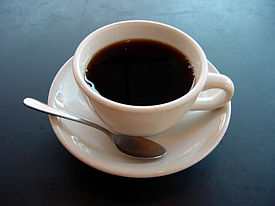It’s a typical weekday morning, and university students are already waiting patiently in the long line at Einstein’s for their cup of coffee to help get them through their busy day of classes, club meetings and homework. Coffee has become a necessity for many college students. After pulling all-nighters, studying for final exams or getting through three-hour turbo classes, coffee supplies students with the necessary amount of caffeine that will help boost energy levels to high rates. But a cup of coffee in the morning has been proven to pack more benefits than just a single boost of energy.
It is accommodating enough that coffee can help people feel less tired and increase energy levels; now, studies have shown that coffee can in fact make you smarter. According to the Department of Physiology and Pharmacology, when the caffeine from coffee is absorbed into the bloodstream and travels to the brain, it blocks off an inhibitory neurotransmitter called adenosine, which leads to a stimulant effect. This improves energy levels, mood and various aspects of brain function such as memory, vigilance, reaction times and general cognitive function.
If you are looking to boost your GPA, I highly suggest upping your intake of coffee consumption if you haven’t already. Or, the next time you are feeling stressed over a final exam, it might be a good idea to drink some freshly roasted coffee beforehand to boost alertness.
There are several other health benefits to coffee that aid in diet and fitness. Caffeine is one of the very few natural substances that has been proven to assist in fat burning. In the American Journal of Clinical Nutrition, studies have shown that caffeine can boost the metabolic rate by three to11 percent. Other studies show that caffeine can increase the burning of fat as much as 10 percent in obese individuals and 29 percent in leaner people.
The next time you are thinking of heading to the gym, it might be a good idea to have a strong cup of coffee about a half-hour before working out. The caffeine from coffee has also been linked to improvements in physical performance.
According to the Scandinavian Journal of Medicine & Science in Sports, caffeine intake can increase adrenaline levels and release fatty acids from the fat tissues, making them available as fuel.
There are surprisingly many nutrients that make it into this dark black beverage. According to SELF Nutrition Data, some of these several important nutrients include riboflavin, pantothenic acid, manganese, potassium, magnesium and niacin. From drinking more than one cup of coffee daily, these essential nutrients can quickly add up.
Surprisingly, many studies have shown that coffee drinkers have a significantly reduced risk of developing certain types of diseases. These include type II diabetes, Alzheimer’s, dementia, Parkinson’s and cirrhosis. Coffee drinkers also have a lower risk of some types of cancer, including liver and colorectal, according to the International Journal of Cancer.
It has been proven that consuming more coffee can lower your risk of liver cancer 40 percent.
Coffee also appears to lower the risk of developing depression, dramatically reduce the risk of suicide and ultimately lead one to live a happier life.
In a Harvard study published in 2011, women who drank 4 or more cups per day had a 20 percent lower risk of becoming depressed.
Given that coffee drinkers are less likely to get many diseases, there have been observational studies showing that coffee drinkers are also more likely to live longer and have a lower risk of premature death.
One of the most groundbreaking studies was published in the New England Journal of Medicine in 2012.
In this study, 402,260 individuals between 50 and 71 years of age were asked about their coffee consumption.
After keeping in touch with the people surveyed for about 12-13 years, the results were remarkable, with those who drank the most coffee being significantly more healthy than those who drank less of it.
Coffee is a major source of antioxidants. In fact, it is the number one source of antioxidants in the U.S., according to researchers at the University of Scranton. Joe Vinson, Ph.D., lead author of this study, states that, “Americans get more of their antioxidants from coffee than any other dietary source. Nothing else comes close.”
Being one of the world’s most popular drinks, you can see now why this unique drink is so prevalent today.
So drink up my fellow coffee lovers, and embrace all of the rich, beneficial antioxidants that this special drink has to offer.


Leave a Reply